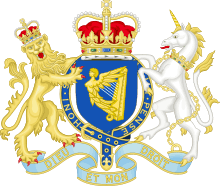Popery Act
An Act to prevent the further Growth of Popery (commonly known as the Popery Act or the Gavelkind Act.[1]) was an Act of the Parliament of Ireland passed in 1703 and amended in 1709, one of a series of Penal Laws against Roman Catholics. The law enforced Irish farm subdivision as a rule of inheritance.
 | |
| Long title | An Act to prevent the further Growth of Popery |
|---|---|
| Citation | 2 Ann c.6 |
| Dates | |
| Royal assent | 1703 |
| Repealed | 13 August 1878 |
| Other legislation | |
| Amended by | Promissory Oaths Act 1871 |
| Repealed by | Statute Law Revision (Ireland) Act 1878 |
Status: Repealed | |
Although the law established a different inheritance rule for Roman Catholics, compared to Protestants, it did so, superficially at least, on reasonable grounds. Traditional Irish law used Gavelkind as the inheritance rule - in which an estate would be divided equally among a dead man's sons; by contrast, England had come to use male primogeniture as the main inheritance principle - with the eldest son receiving the entire estate. The Gavelkind Act, simply enforced the traditional Irish law on Roman Catholics, and the English law on Protestants.
However, if the eldest son of a Roman Catholic family converted to the Protestant faith, he would no longer have to share his father's estate with his siblings (by Gavelkind), but could instead keep all of it for himself (by primogeniture). Thus the law had the effect of reducing the size - and influence - of Roman Catholic landed estates; this was that Act's ulterior motive[1]
Its citation is 2 Ann c.6.
Catholic land holdings:
- 1688: 25% of land
- 1704: 14% of land
- 1776: 5% of land
Sir Toby Butler, the former Solicitor General for Ireland, a Roman Catholic, made a celebrated speech at the bar of the Irish House of Commons denouncing the Act as being "against the laws of God and man...against the rules of reason and justice". Other eminent Catholic lawyers like Stephen Rice also denounced the measure, but to no avail.
Section XVII required any person with a civil or military office to subscribe to a declaration on transubstantiation and take an oath of abjuration, and also receive the sacrament of the Lord's Supper according to the usage of the Church of Ireland within three months. As well as excluding Roman Catholics from office, the final requirement excluded non-conformist Protestants, notably Presbyterians, and many had to step down from municipal corporations and other positions. For example, in Londonderry, ten Alderman and ten Burgesses had to resign.[2]
References
- Andrew Lyall; Land Law in Ireland; ISBN 1-85800-199-4
- The Annals of Derry, Robert Simpson 1847